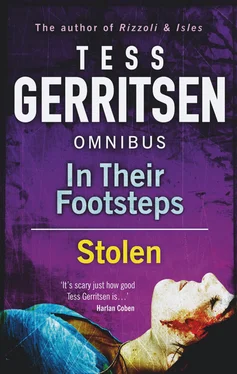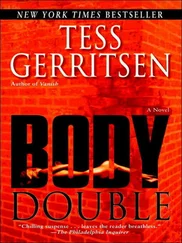“I’m not your responsibility.”
“But you are.”
“And who decided that?”
He reached for her then, trapping her face in his hands. “I did,” he whispered, and pressed his lips to hers. She was so stunned by the ferocity of his kiss that at first she couldn’t react; too many glorious sensations were assaulting her at once. She heard his murmurings of need, felt the hot surge of his tongue into her mouth. Her own body responded, every nerve singing with desire. She was oblivious to the traffic, the passersby on the sidewalk. There were only the two of them and the way their bodies and mouths melted together. All day they’d been fighting this, she thought. And all day she knew it was hopeless. She knew it would come to this—one kiss on a Paris street, and she was lost.
Gently he pulled away and gazed down at her. “ That’s why you have to leave Paris,” he murmured.
“Because you command it?”
“No. Because it makes sense.”
She stepped back, desperate to put space between them, to regain some control—any control—over her emotions. “Sense to you, perhaps,” she said softly. “But not to me.” Then she turned and climbed into his car.
He slid in beside her and shut the door. Though they sat in silence, she could feel his frustration radiating throughout the car.
“What can I say that would make you change your mind?” he asked.
“My mind?” She looked at him and managed a tight, uncompromising smile. “Absolutely nothing.”
“IT’S RATHER a sticky situation,” said Reggie Vane. “If the charges weren’t so serious—theft, perhaps, or even assault—then the embassy might be able to do something. But murder? I’m afraid that’s beyond diplomatic intervention.”
They were talking in Reggie’s private study, a masculine, dark-paneled room very much like her Uncle Hugh’s at Chetwynd. The bookshelves were lined with English classics, the walls hung with hunting scenes of foxes and hounds and gentlemen on horseback. The stone fireplace was an exact copy, Reggie had told them, of the hearth in his childhood home in Cornwall. Even the smell of Reggie’s pipe tobacco reminded Beryl of home. How comforting to discover that here, on the outskirts of Paris, was a familiar world transplanted straight from England.
“Surely the ambassador can do something?” said Beryl. “This is Jordan we’re talking about, not some soccer-club hooligan. Besides, he’s innocent.”
“Of course he’s innocent,” said Reggie. “Believe me, if there was anything I could do about it, our Jordan wouldn’t stay in that cell a moment longer.” He sat down on the couch beside her and clasped her hands, the whole time focusing his mild blue eyes on her face. “Beryl, darling, you have to understand. Even the ambassador himself can’t work miracles. I’ve spoken to him, and he’s not optimistic.”
“Then there’s nothing you or he can do?” Beryl asked miserably.
“I’ll arrange for a lawyer—one our embassy recommends. He’s an excellent fellow, someone they call in for just this sort of thing. Specializes in English clients.”
“And that’s all we can hope for? A good attorney?”
Reggie’s answer was a regretful nod.
In her disappointment, Beryl didn’t hear Richard move to stand close behind her, but she did feel his hands coming to rest protectively on her shoulders. How I’ve come to rely on him, she thought. A man I shouldn’t trust. And yet I do.
Reggie looked at Richard. “What about the Intelligence angle?” he asked. “Any evidence forthcoming?”
“French Intelligence is working with the police. They’ll be running ballistic tests on the gun. No fingerprints were found on it. The fact that he’s Lord Lovat’s nephew will get him some special consideration. But in the end, it’s still a murder charge. And the victim’s a Frenchwoman. Once the local papers get hold of the story, it will sound like some spoiled English brat trying to slither out of criminal charges.”
“And there’s enough ill will toward us British as it is,” said Reggie. “After thirty years in this country, I should know. I tell you, as soon as my year’s up at the bank, I’m going home.” His gaze wandered longingly to the painting over the mantelpiece. It was of a country home, its walls festooned with blue wisteria blossoms. “Helena hated it in Cornwall—thought the house was far too primitive. But it suited my parents. And it suits me.” He looked at Beryl. “It’s a frightening thing, getting into trouble so far from home. One is always aware that one is vulnerable. And neither class nor money can make things right.”
“I’ve told Beryl she should fly home,” said Richard.
Reggie nodded. “My feelings exactly.”
“I can’t,” said Beryl. “I’d feel like a rat jumping ship.”
“At least you’d be a live rat,” said Richard.
Angrily she shrugged off his touch. “But a rat all the same.”
Reggie reached for her hand. “Beryl,” he said quietly, “listen to me. I was your mother’s oldest friend—we grew up together. So I feel a special responsibility. And you have no idea how painful it is for me to see one of Madeline’s children in such a fix. It’s awful enough that Jordan’s in trouble, but to worry about you, as well…” He gave her hand a squeeze. “Listen to your Mr. Wolf here. He’s a sensible fellow. Someone you can trust.”
Someone I can trust. Beryl felt Richard’s gaze on her back, felt it as acutely as a touch, and her spine stiffened. She focused firmly on Reggie. Dear Reggie, whose shared past with Madeline made him part of her family.
She said, “I know you mean only the best, Reggie, but I can’t leave Paris.”
The two men looked at each other, exchanging shared expressions of frustration, but not surprise. After all, they had both known Madeline; they could expect nothing less than stubbornness from her daughter.
There was a knock on the study door. Helena poked her head in. “All right for me to come in?”
“Of course,” said Beryl.
Helena entered, carrying a tray of tea and biscuits, which she set down on the end table. “I’m always careful to ask first,” she said with a smile as she poured out four cups, “before I trespass in Reggie’s private abode.” She handed Beryl a cup. “Have we made any headway, then?”
From the silence that greeted her question, Helena knew the answer. She looked at once apologetic. “Oh, Beryl. I’m so sorry. Isn’t there something you can do, Reggie?”
“I’m already doing it,” said Reggie, with more than a hint of impatience. Turning his back to her, he took a pipe down from the mantelpiece and lit it. For a moment, there was only the sound of the teacups clinking on saucers and the soft put-putput of Reggie’s lips on the pipe stem.
“Reggie?” ventured Helena again. “It seems to me that calling an attorney is merely being reactive. Isn’t there something, well, active that could be done?”
“Such as?” asked Richard.
“For instance, the crime itself. We all know Jordan couldn’t have done it. So who did?”
Reggie grunted. “You’re hardly qualified as a detective.”
“Still, it’s a question that will have to be answered. That young woman was killed while watching over Jordan. So this may all stem from the reason Jordan’s in Paris to begin with. Though I can’t quite see how a twenty-year-old case of murder could be so dangerous to someone.”
“It was more than murder,” Beryl observed. “Espionage was involved.”
“That business with the NATO mole,” Reggie said to Helena. “You remember. Hugh told us about it.”
“Oh, yes. Delphi.” Helena glanced at Richard. “MI6 never actually identified him, did they?”
Читать дальше












